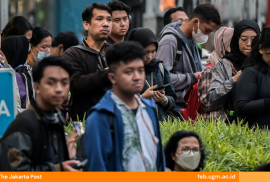
The government’s budget efficiency measures have drawn considerable attention, including in the field of education. Professor of the Faculty of Economics and Business Universitas Gadjah Mada (FEB UGM), Prof. Dr. R. Agus Sartono, M.B.A., said the efficiency measures must be taken carefully so as not to negatively affect the quality of higher education in Indonesia.
“Education budget cuts must be careful and scrutinized,” said the lecturer at the Department Management, FEB UGM, Saturday (15/2/2025).
Agus emphasized that the cuts must be done selectively. This budget reduction should target administrative programs that do not have a direct impact on the quality of education. For example, budget reductions for official travel, comparative studies, and seminars can be rationalized.
However, he also reminded us that budget reductions in these sectors must still consider the impact on the regional economy. If government spending on activities such as seminars and FGDs drops dramatically, the hospitality industry and other related sectors will be affected. Therefore, there must be anticipatory steps so that budget efficiency does not cause economic contraction.
According to him, education budget cuts should not neglect the rights of the main actors driving the education sector, namely teachers, lecturers, and education personnel. This is because these actors have an important role in education.
“Infrastructure can be postponed for 1-2 years, but the rights of teachers and lecturers cannot be postponed, including the recruitment of teachers and lecturers to fill those who have retired. If this is allowed, there will be a gap,” he explained, adding that if the welfare of teachers and lecturers is not met, it will create a negative signal for the best graduates to work as teaching staff.
Agus emphasized that investment in education is the key to civilization building and national progress. He gave an example of developed countries such as Europe that have a strong academic tradition because they place the profession of teachers and lecturers in an honorable position.
“Without education, there will be no civilization. Developed countries have committed to investing in human resource development,” said the man who served as Deputy for Education and Religion at the Coordinating Ministry for Welfare (2010-2014) and Deputy for Education and Religion at the Coordinating Ministry for Human Development (2014-2021).
He also refused if the budget cuts targeted scholarships, including the KIP Lecture scholarship (KIP-K), the 3T Region scholarship, and the ADik and ADEM scholarships. Because the scholarship is an instrument to break the chain of poverty and minimize social inequality. If this budget is cut, it will be increasingly difficult for the poor to access higher education.
Agus added that there is a big concern about budget cuts in the education sector, especially the impact on state universities (PTN). He hopes that the budget cuts will not force universities to increase the single tuition fee (UKT).
One of the main concerns of budget cuts is the impact on state universities. “Do not let the budget cuts force PTNs to raise the single tuition fee (UKT). If government intervention is reduced but on the other hand PTNs are asked to continue to meet the needs of lecturers and education personnel, then this could be a dilemma that triggers turmoil on campus.
Agus further said that the government is obliged to allocate at least 20% of the APBN and APBD for education functions. This is as mandated in the 1945 Constitution. Although the central government has fulfilled this provision by increasing the education budget from year to year, local governments still rely on the transfer of funds from the center without allocating the education budget independently. “Provincial and district/city governments still depend on central transfer funds, which account for more than 20% of the total education budget. If calculated, most of the funds are used for teacher salaries, as if the district/city does not need to allocate additional funds,” he explained.
In addition, he also highlighted potential leaks in the implementation of the education budget, such as the distribution of School Operational Assistance (BOS) and Smart Indonesia Card (KIP) funds that are not always on target. “There are cases where KIP recipient students in remote areas have difficulty collecting assistance due to limited access, and in the end, the funds are managed by the school. This needs to be improved so that students’ rights reach the right hands,” he added.
Agus said that budget efficiency is not an easy thing. Even so, he again emphasized that budget savings should not sacrifice the future of the nation’s children.
“Why not efficiency by downsizing the government structure? Other countries have leaner cabinets, but the current government conditions with a fat position, this efficiency message does not appear,” he concluded.
Reportase: Kurnia Ekaptiningrum
Sustainable Development Goals








